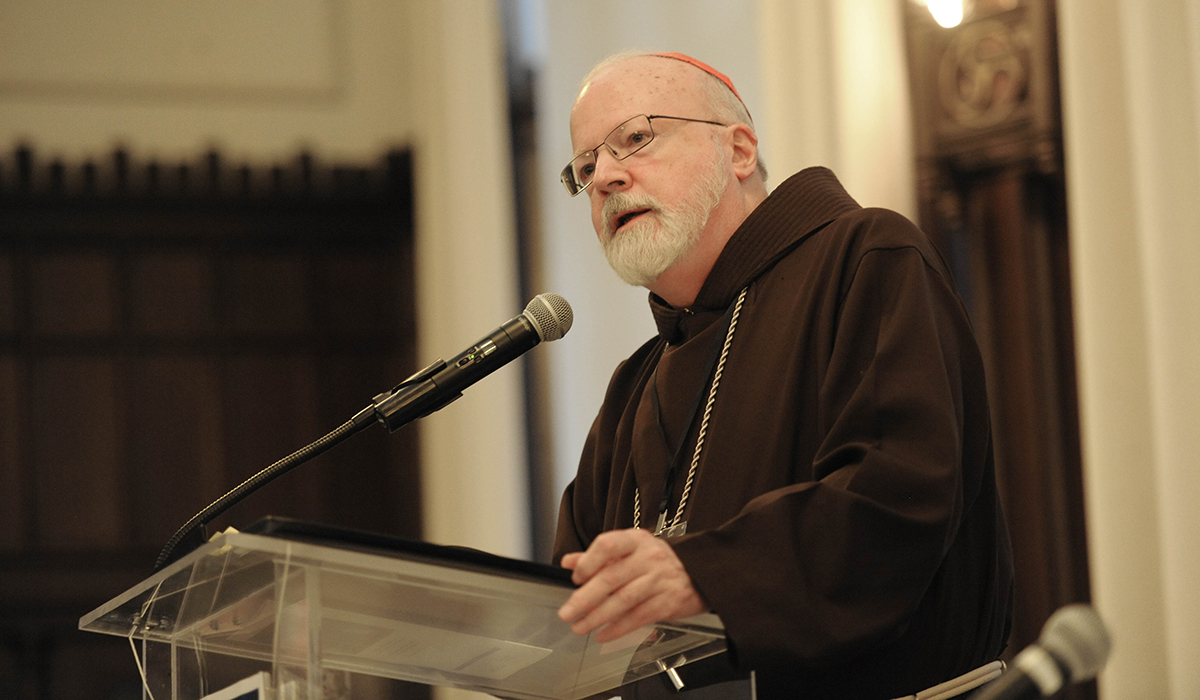

Speaking at The Catholic University of America on Tuesday, Jan. 10, Cardinal Seán O’Malley, O.F.M. Cap., emphasized the importance of a global economy that serves the needs of humanity rather than dominates it.
“In the midst of the forces of technology and globalization, people cannot be reduced to arguments for greater efficiency,” said Cardinal O’Malley, who is chairman of the University’s Board of Trustees. “The Pope has stressed the need for equity, for fairness in our understanding of what constitutes a just economy and the role of workers.”
The cardinal spoke as part of a special conference, “Erroneous Autonomy: The Dignity of Work,” which was hosted by the University’s Institute for Policy Research & Catholic Studies (IPR) with support from the American Federation of Labor and Congress of Industrial Organizations (AFL-CIO). The conference was intended to explore capitalism, governance, and the dignity of work through the lens of Catholic Social Doctrine.
“Erroneous Autonomy … reflects the Catholic Church’s concern that systems of untethered competing individual choices can lead to outcomes that are contrary to morality and contrary to the common good,” said Stephen Schneck, director of IPR and associate professor of politics.
In economic systems where profit rules all, Schneck said human work “can be robbed of its inherent dignity and can become something to be bought and sold, reduced to something like profit, replaced by machines, and objectified in ways that deface or lose sight of the luminous child of God that finds purpose in work.”
Cardinal O’Malley was joined at the conference by Bishop Robert McElroy of San Diego, whose lecture, titled “Three Kinds of Erroneous Autonomy,” addressed three framing worldviews at work in the world today that can cause damage if they are separated from any kind of moral identity: the drive for the sovereignty of markets; the technocratic paradigm that seeks dominance over the environment and culture; and nationalism.
Although none of these in themselves are inherently good or bad, Bishop McElroy believes they can cause undue damage to society, allowing people to place the needs of humanity second to goals like free markets, technological progress, and national pride.
“It is not in their internal structures that the drive for free markets, the technocratic perspective, or nationalism are dangerous,” he said. “It is when they are morally autonomous, when they in themselves are directive of cultural thinking and public policy, that they become perilous for the well-being of our nation. It is our task as a people to reconnect these cultural currents to sound moral anchors.”
Other speakers at the conference included author and social critic Thomas Frank, who examined how erroneous autonomy has shifted American politics over the past several decades and Richard Trumka, president of the AFL-CIO, who addressed the ways labor unions and the Catholic Church have long worked together to protect the needs of workers around the country.
During a panel discussion, Sister Carol Keehan, D.C., president of the Catholic Health Association; Joan Rosenhauer, executive vice president of Catholic Relief Services; David Cloutier, associate professor of theology at Catholic University and author of The Vice of Luxury: Economic Excess in a Consumer Age; and Holly Taylor Coolman, professor of theology at Providence College, examined the various ways erroneous autonomy can affect healthcare, international development, the environment, and family life.
This event was the third in a series of “Erroneous Autonomy” conferences hosted by IPR. The series, which draws its name from writings by Pope Paul VI, previously explored “the Catholic case against libertarianism” and the relationship between solidarity and faith.
For more information or to access additional conference content, go to iprcua.com. For a full-length video of the conference, visit Catholic University's Vimeo page.